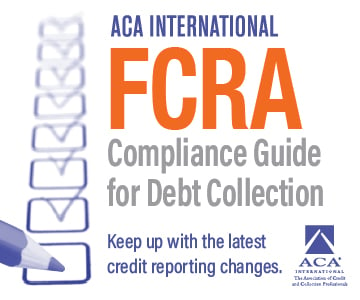 A rundown of recent top FCRA, TCPA and FDCPA cases from ACA.
A rundown of recent top FCRA, TCPA and FDCPA cases from ACA.
03/31/2023 3:00 P.M.
4 minute read
Each week, ACA International’s compliance team covers relevant case summaries for ACA members. Members may also submit cases for consideration to our compliance team at [email protected].
Here are the cases covered March 28 – 31:
March 28:
Snyder v. Landcar Management: Ringless Voicemails are Calls Under the TCPA
A consumer received two calls to his landline number from an auto dealership, both containing prerecorded messages delivered via a ringless voicemail technology. The consumer’s number was listed on the National Do Not Call Registry and the consumer did not provide consent to be called on his landline. The consumer sued the debt collector for violating the TCPA.
Continue reading the case summary here.
Stephenson v. Mountain Run: Court Enters Default Judgment Against Collector on FDCPA and FCRA Claims Involving White Pages Fraud
A collection agency furnishing data to a consumer reporting agency must have sufficient evidence to support the conclusion that the reported information was true. A Florida district court entered a default judgment against a collector that failed to offer any evidence showing a debt it reported was valid.
Continue reading the case summary here.
Valentine v. Mullooly, Jeffrey, Rooney & Flynn: No Standing for Alleged FDCPA Informational Injury
A New Jersey district court found that a consumer lacked standing for her claims that a collection letter violated the FDCPA.
Continue reading the case summary here.
March 29:
Remis v. Trans Union: Court Dismissed FCRA Claims by Consumer Who Admitted, Then Denied Debt Was His
A consumer admitted he owed a debt as part of his settlement of a collection lawsuit. However, the doctrine of judicial estoppel prevented the consumer from asserting later in an FCRA action that the debt was wrongfully reported because it did not belong to him.
Continue reading the summary here.
DeBoskey v. Statebridge: Filings in Foreclosure Proceedings Do Not Toll FDCPA Statute of Limitations
A consumer sued a mortgage service company and its attorney for violating the FDCPA. The defendants moved to dismiss the consumer’s claim on the grounds that it was time barred.
Continue reading the summary here.
Laura v. Experian: A Debt That Was Not Listed in a Plaintiff’s Bankruptcy Schedule Was Not Discharged
An Illinois district court dismissed a consumer’s FCRA claim regarding an account that the consumer believed was discharged in bankruptcy because the account was not listed in the consumer’s bankruptcy schedule and thus was not dismissed.
Continue reading the summary here.
March 30:
Howard v. LVNV Funding: Court Approves Class Certification in FDCPA Action Involving Bankruptcy Proof of Claim Form
Where a collector represented to a group of individuals that their debts were composed only of the debt principal while account statements or other records showed the debts included interest and fees, the consumers had a sufficiently common interest to be certified as a class.
Continue reading the summary here.
Foster v. National Recovery Agency: Hospital Intake Form with Consumer’s Cellphone Number Was Not Express Consent
A consumer alleged that a debt collector attempted to collect a medical debt that he supposedly owed by repeatedly calling the consumer’s cellphone using an automated telephone dialing system and by using a prerecorded voice to leave messages on his cellphone even after he asked the debt collector to stop.
Continue reading the summary here.
Calderone v. Linebarger Goggan Blair & Sampson LLP: Court Finds Traffic Fines Are Not a Debt Under the FDCPA
A Washington district court found that a consumer could not pursue his FDCPA claims related to the collection of traffic fines because the fines did not constitute a debt as defined under the FDCPA.
Continue reading the summary here.
March 31:
Harrari v. Experian: Reporting Settled Accounts as Charged Off Did Not Violate the FCRA
A New Jersey district court found that charge offs constitute “adverse items of information” under the FCRA that can be reported by a CRA for up to seven years.
Continue reading the summary here.
Wolf v. Carpenter Hazelwood, Delgado & Bolen: HOA’s Grace Period to Pay Assessment Considered an Extension of Credit
An attorney was hired to collect unpaid assessments from a consumer and pulled her credit report to learn her address without her permission. The consumer sued the attorney for violating the FCRA. The district court granted summary judgment in favor of the attorney, and the consumer appealed the decision.
Continue reading the summary here.
Lawson v. Visionworks: Florida Court Holds Three Text Messages Do Not Create Concrete Injury Under the TCPA
When assessing a consumer’s allegations of concrete harm in the context of a TCPA claim, a few seconds of wasted time caused by three text messages is not enough to constitute standing, although the assessment of harm must be qualitative, not quantitative in nature.
Continue reading the summary here.
Visit the Industry Advancement Fund webpage for more Daily Decision recaps and compliance resources.
If you’ve recently obtained a judicial opinion that might benefit other ACA members, email it to us: [email protected].
- Join the discussion on legal and compliance topics with your fellow members on the Members Attorney Program community on The Hub. Simply log on to The Hub and select Members Attorney Program under the Communities menu.
- ACA’s Daily Decision is powered by ACA’s Litigation Advocacy and Compliance Teams.
 A rundown of recent top FCRA, TCPA and FDCPA cases from ACA.
A rundown of recent top FCRA, TCPA and FDCPA cases from ACA.









